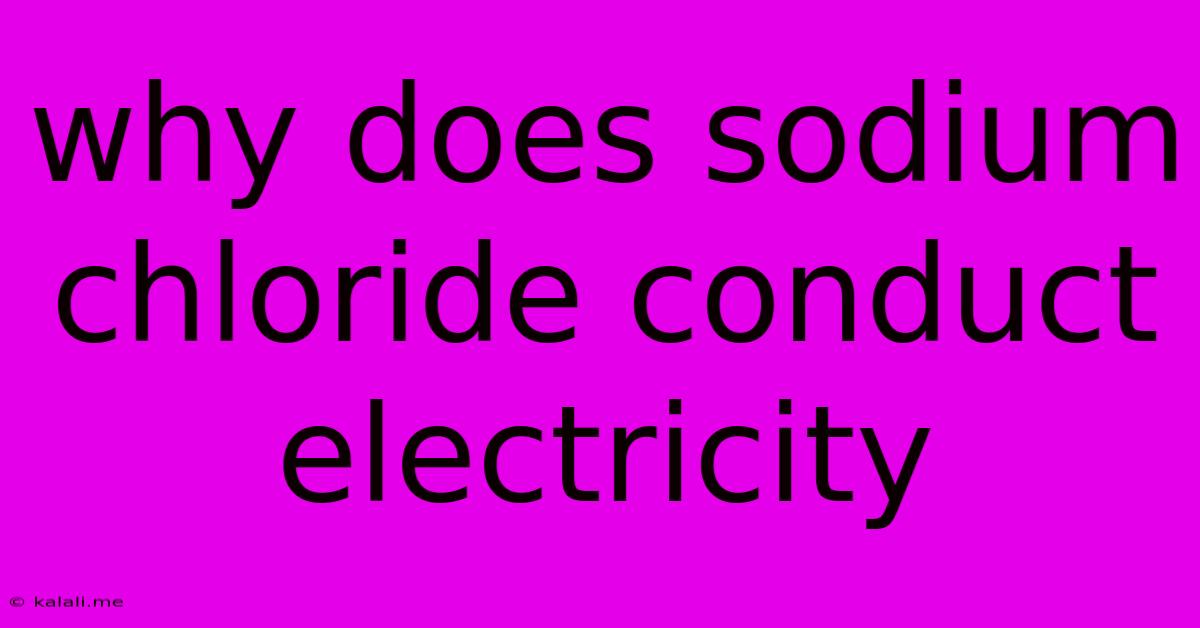Why Does Sodium Chloride Conduct Electricity
Kalali
May 19, 2025 · 3 min read

Table of Contents
Why Does Sodium Chloride Conduct Electricity? A Deep Dive into Ionic Conductivity
Meta Description: Discover why sodium chloride (table salt) conducts electricity, exploring the role of ions, solutions, and the difference between molten and solid states. Learn about the process of electrolysis and its applications.
Sodium chloride, or common table salt, is a fascinating substance with a surprising property: it conducts electricity, but only under specific conditions. Unlike metals which conduct electricity readily due to the free movement of electrons, sodium chloride's conductivity depends on the presence of mobile ions. This article will delve into the reasons behind this unique behavior.
Understanding Ionic Compounds
Sodium chloride is an ionic compound, meaning it's formed through the electrostatic attraction between positively charged ions (cations) and negatively charged ions (anions). In NaCl, sodium (Na) loses an electron to become a positively charged Na⁺ ion, while chlorine (Cl) gains an electron to become a negatively charged Cl⁻ ion. These ions are held together in a strong, crystalline lattice structure.
Conductivity in Solution
In its solid state, the ions in sodium chloride are locked in a rigid lattice. They are not free to move, preventing the flow of electric current. However, when sodium chloride is dissolved in water, it dissociates into its constituent ions: Na⁺ and Cl⁻. These ions are now free to move around in the solution.
When an electric field is applied across the solution, these mobile ions migrate: positively charged Na⁺ ions move towards the negative electrode (cathode), and negatively charged Cl⁻ ions move towards the positive electrode (anode). This movement of charge carriers constitutes an electric current, thus explaining why sodium chloride solution conducts electricity. The water molecules play a crucial role here, effectively solvating the ions and preventing them from re-associating. This process is crucial in many applications, such as electrolysis.
Conductivity in Molten State
Another condition where sodium chloride conducts electricity is in its molten (liquid) state. When heated to a high enough temperature, the strong ionic bonds in the crystal lattice are overcome, and the ions become mobile. Similar to the solution state, the application of an electric field causes the ions to migrate, resulting in the flow of electric current. This principle is utilized in the industrial production of sodium and chlorine through the process of electrolysis of molten sodium chloride.
The Role of Electrolysis
Electrolysis is the process of using direct electric current to drive a non-spontaneous chemical reaction. In the case of molten sodium chloride, the passage of electricity causes the Na⁺ ions to gain electrons at the cathode, forming sodium metal (Na), while the Cl⁻ ions lose electrons at the anode, forming chlorine gas (Cl₂). This demonstrates the direct link between ionic mobility and electrical conductivity.
Why Solid NaCl Doesn't Conduct
To reiterate, solid sodium chloride does not conduct electricity because its ions are rigidly held in place within the crystal lattice. There are no free charge carriers to move and carry the current. The application of an electric field does not cause the ions to migrate as they are essentially "stuck."
Conclusion
The electrical conductivity of sodium chloride is a direct consequence of the mobility of its constituent ions. While solid NaCl is an insulator, both dissolved and molten NaCl are excellent conductors. This property is fundamental to many important industrial processes, particularly electrolysis, highlighting the significant practical implications of understanding ionic conductivity.
Latest Posts
Latest Posts
-
What Does Com Mean In Light Switch
May 19, 2025
-
Why Does My Washing Machine Smell Damp
May 19, 2025
-
How To Turn On Find My Mac
May 19, 2025
-
Do You Have To Peel Sweet Potatoes
May 19, 2025
-
How To Get Pencil Off The Wall
May 19, 2025
Related Post
Thank you for visiting our website which covers about Why Does Sodium Chloride Conduct Electricity . We hope the information provided has been useful to you. Feel free to contact us if you have any questions or need further assistance. See you next time and don't miss to bookmark.